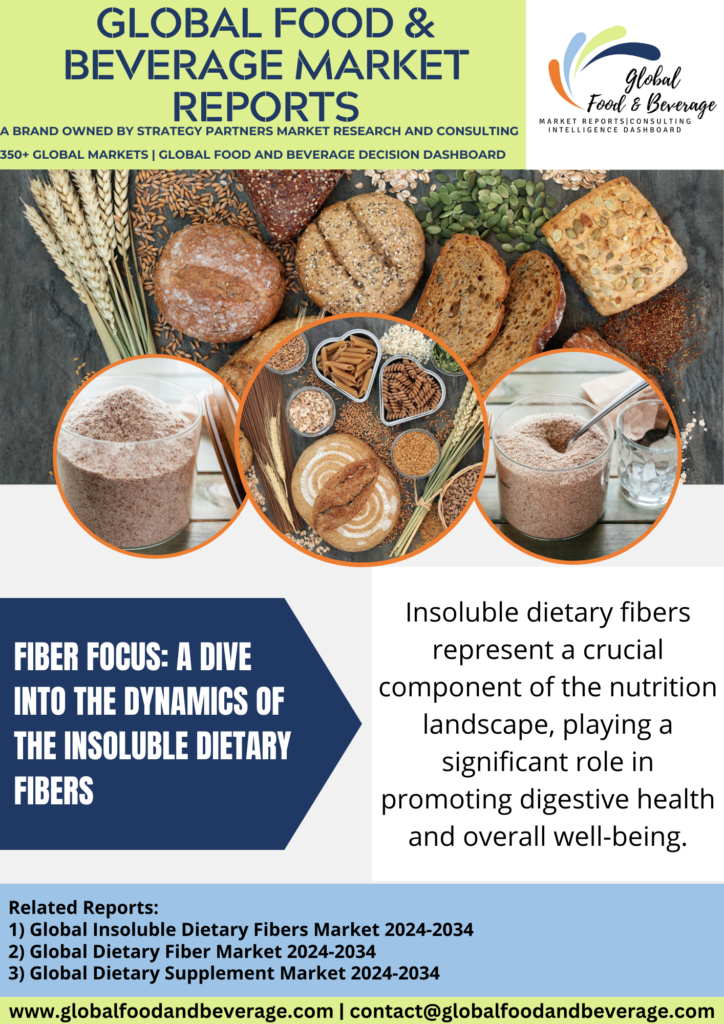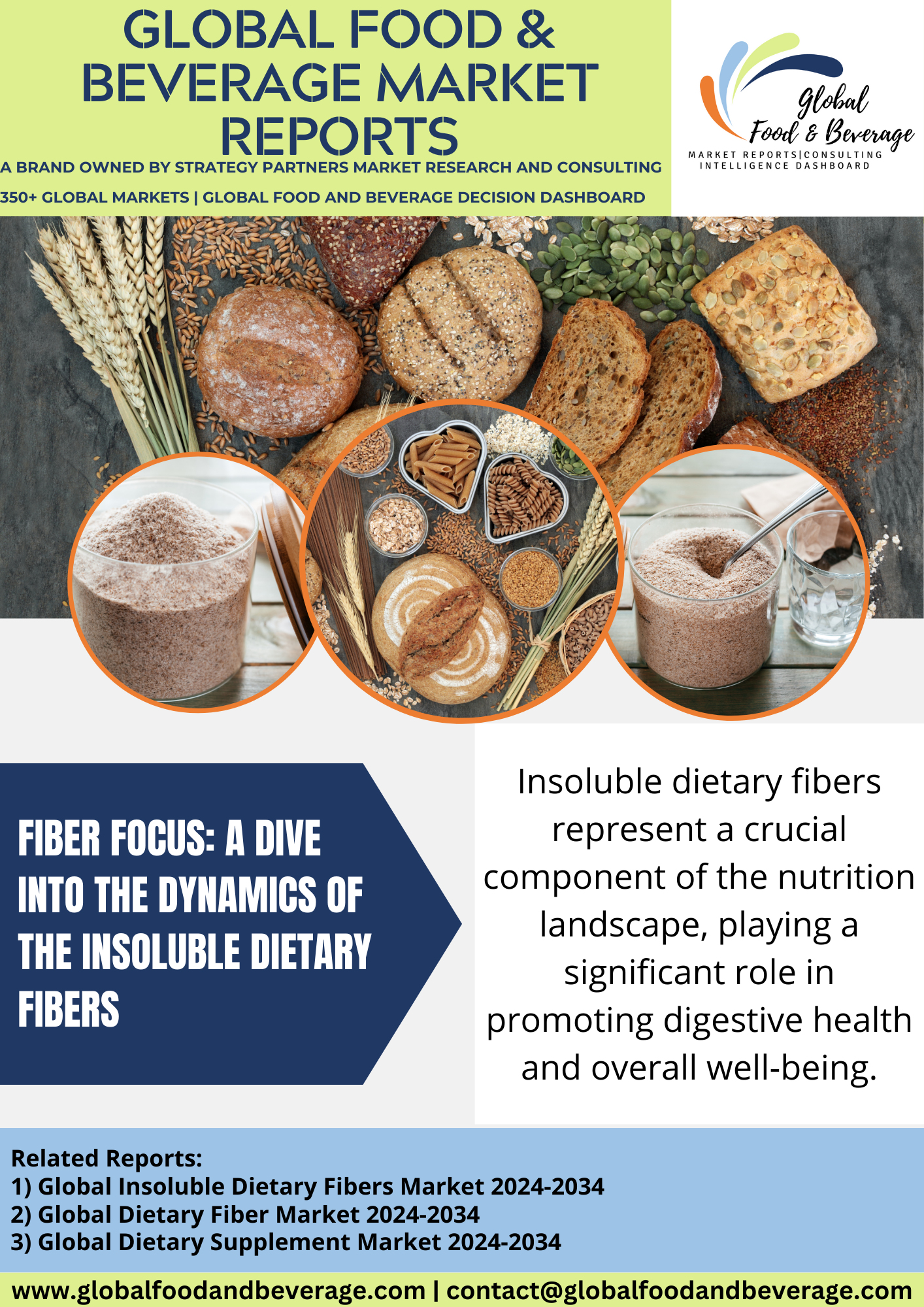Fiber Focus: A Dive into the Dynamics of the Insoluble Dietary Fibers Market

Insoluble dietary fibers are a crucial component of our diet, known for their unique characteristics and significant impact on digestive health. Unlike soluble fibers that dissolve in water, insoluble fibers do not dissolve and remain intact as they pass through the digestive system. Found in foods like whole grains, vegetables, and nuts, these fibers contribute to overall well-being in several ways.
One primary role of insoluble dietary fibers is to promote digestive regularity and prevent constipation. These fibers add bulk to the stool, softening it and facilitating its movement through the intestines. As they pass through the digestive tract, insoluble fibers absorb water and help regulate bowel movements, promoting a healthy and efficient digestive process.
Another notable benefit of insoluble dietary fibers lies in their ability to support colon health. Some studies suggest that these fibers may help reduce the risk of colorectal cancer by promoting the elimination of waste and potentially preventing harmful substances from lingering in the colon. The bulk-forming nature of insoluble fibers also contributes to a feeling of fullness, which can be beneficial for weight management by reducing overall food intake.
In addition to their impact on digestion, insoluble dietary fibers play a role in blood sugar control. The slow digestion and absorption of nutrients associated with a high-fiber diet, including insoluble fibers, can help stabilize blood sugar levels, making it beneficial for individuals with diabetes or those at risk of developing the condition.
Whole foods, such as wheat bran, brown rice, and vegetables like broccoli and carrots, are rich sources of insoluble dietary fibers. Including a variety of these foods in the diet ensures a sufficient intake of these fibers, contributing to overall digestive health and well-rounded nutrition. While meeting daily fiber recommendations is essential, it’s equally crucial to stay adequately hydrated, as insoluble fibers absorb water to perform their functions effectively.
ADVANCEMENTS
Insoluble dietary fibers showcase their growing importance in promoting digestive health and overall well-being. One significant breakthrough is the development of innovative sources of insoluble dietary fibers. Traditionally sourced from wheat bran and other grains, new plant-based sources, such as chicory root, bamboo shoots, and fruit peels, are being explored. This diversification caters to the increasing demand for gluten-free and allergen-free dietary fiber options.
Advancements in extraction and processing technologies contribute to the production of highly purified insoluble dietary fibers. Improved methods, such as micronization and grinding, enhance the particle size and dispersibility of fibers in food and beverage products, ensuring better incorporation and palatability.
Incorporation of insoluble dietary fibers into various food and beverage applications is expanding. Manufacturers are fortifying products such as baked goods, cereals, snacks, and beverages with insoluble fibers to increase their fiber content without compromising taste and texture. This trend aligns with consumer preferences for functional and fiber-rich options.
The development of insoluble dietary fiber supplements offers convenient alternatives for individuals seeking to boost their fiber intake. These supplements, available in various forms such as capsules, powders, and gummies, provide a convenient option for consumers looking to supplement their diets with additional fiber for digestive health.
Research on the health benefits of insoluble dietary fibers is advancing, shedding light on their role in preventing constipation, promoting regular bowel movements, and supporting gut health. This scientific understanding is influencing dietary recommendations and contributing to the growing awareness of the importance of insoluble fibers in a balanced diet.
CHALLENGES
Insoluble dietary fibers, despite their numerous health benefits, encounter challenges related to production, formulation, market dynamics, and consumer perception. One significant challenge is the extraction and processing of insoluble fibers from plant sources. Ensuring the efficient extraction of these fibers without compromising their structural integrity can be challenging, impacting the overall quality and functionality of the final product.
Formulating products with insoluble dietary fibers poses challenges related to taste, texture, and stability. Incorporating these fibers into various food and beverage applications while maintaining consumer acceptance requires careful consideration of sensory attributes and potential textural changes.
Market competition is intense, with various dietary fiber products available. Successfully differentiating insoluble fiber products, addressing diverse applications, and staying competitive demand continuous innovation in formulations, functionalities, and marketing strategies.
Regulatory compliance is a complex challenge in the insoluble dietary fibers industry, especially concerning health claims, labeling requirements, and safety standards. Adhering to diverse and evolving regulations across regions or countries requires continuous diligence to ensure transparency and compliance with global standards.
Consumer education is vital for promoting the benefits and uses of insoluble dietary fibers. Effectively communicating the role of these fibers in digestive health and their contribution to overall well-being is essential for building consumer awareness and trust.
Sustainability considerations, including responsible sourcing of raw materials and eco-friendly processing methods, are emerging challenges. Meeting consumer demands for ethical and sustainable practices adds complexity to the production and marketing of insoluble dietary fiber products.
CONCLUSION
Insoluble dietary fibers emerge as silent health heroes, promoting digestive wellness and contributing to overall vitality. From enhancing bowel regularity to supporting weight management, these fibers play a vital role in holistic health. The industry’s dedication to incorporating insoluble fibers into diverse food formulations aligns with growing consumer awareness of the importance of fiber-rich diets. As dietary trends evolve towards health-conscious choices, insoluble fibers stand as champions in meeting these nutritional demands. The future holds promise for continued innovation, promoting the seamless integration of these fibers into a myriad of products, fostering a global culinary landscape where taste and wellness beautifully converge.
